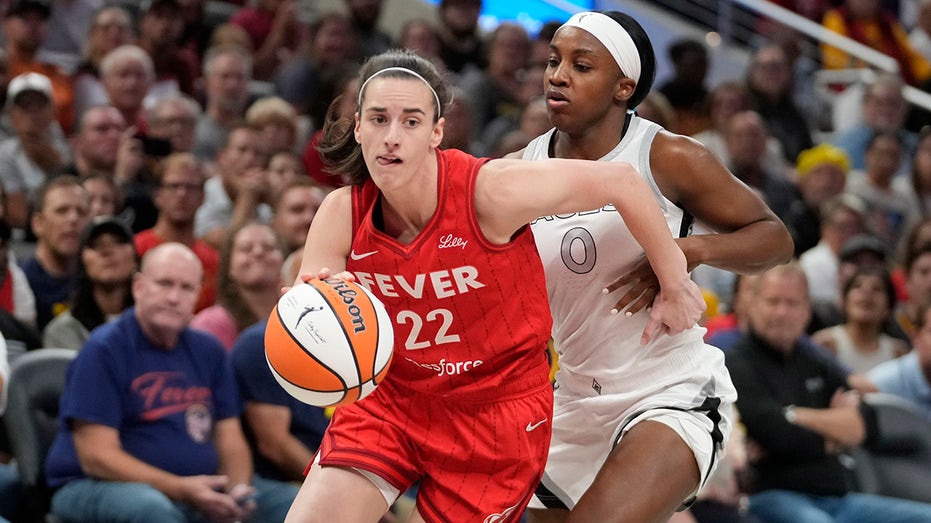The WNBA is currently experiencing a full-scale fanbase feud, with many longtime supporters and even some players feeling slighted by the meteoric rise of rookie sensation Caitlin Clark. The Indiana Fever’s latest star is set to appear in 41 nationally televised games this season, and not everyone is happy about it—especially Las Vegas Aces superstar A’ja Wilson and a vocal minority of fans.

The Controversy: Caitlin Clark’s 41 National TV Games
Clark’s arrival in the WNBA has brought an unprecedented surge in viewership, ticket sales, and media coverage. Despite this, some of the league’s established players and longtime fans seem to be more concerned with how much attention Clark is receiving rather than celebrating the growth of the sport. Wilson and other players, including Angel Reese, have been rumored to be frustrated by Clark’s dominance in the national spotlight.
Some fans and commentators have even gone as far as suggesting a boycott of Indiana Fever games, hoping to bring down viewership numbers and balance the national exposure across all teams. This movement, however, has been met with criticism, as many argue that Clark’s impact benefits the entire league, increasing sponsorships and potentially leading to higher player salaries.
Clark’s Impact on the WNBA
Clark’s presence has created an undeniable shift in women’s basketball. Indiana Fever games are selling out like never before, ESPN and other networks are adding more WNBA coverage, and social media is buzzing with Clark’s highlights and debates about her effect on the league. In an era where women’s basketball has struggled for mainstream attention, Clark’s star power is proving to be a game-changer.
Yet, instead of embracing the momentum, some critics argue that the league is playing favorites. Wilson, a three-time MVP, has expressed frustration with how black women in the WNBA are often overlooked. Her remarks suggest that race plays a role in the disparity of media attention, a point that has fueled deeper conversations about representation in women’s sports.
The Reality of the Boycott Movement
The so-called boycott of Indiana Fever games is being pushed by a minority of fans who feel that the traditional players of the WNBA are being overshadowed by a newcomer. However, this effort seems counterproductive. Clark’s rising popularity is bringing financial opportunities to the entire league. Higher viewership numbers lead to increased television deals, bigger sponsorships, and ultimately, higher player salaries.

Clark’s influence is already being felt beyond individual game ratings. Before her arrival, WNBA games were averaging around 200,000 viewers per game. Now, that number has skyrocketed, with some games drawing over a million viewers. This isn’t just a small uptick—it’s a massive shift that could redefine the WNBA’s financial landscape.
The Bigger Picture
It’s undeniable that Clark’s popularity is reshaping the WNBA. Instead of seeing her as a threat, players like Wilson and Reese could benefit from the league’s rising profile. The increased attention means better contracts, more lucrative endorsement deals, and an overall stronger WNBA brand.
Critics need to understand that the WNBA isn’t a zero-sum game. One player’s success doesn’t diminish another’s—it enhances the league as a whole. If Clark continues to draw millions of new fans, it will ultimately lead to more coverage, more opportunities, and more respect for all WNBA athletes.
The backlash against Clark’s success appears to be more about ego than actual concern for the league’s growth. While some longtime WNBA supporters might feel like their ‘exclusive club’ has been infiltrated by new fans, the reality is that the league desperately needed this kind of visibility. Instead of resisting the change, embracing it could mean a stronger and more financially stable future for everyone involved in women’s basketball.
Conclusion
Clark’s 41 nationally televised games are a reflection of her impact, not favoritism. Her presence is ushering in a new era for the WNBA, one where higher ratings and bigger sponsorships could lead to financial growth for all players. The so-called boycott movement is not only ineffective but also shortsighted. Rather than trying to sabotage Clark’s success, the WNBA community should celebrate what she brings to the league: a fresh wave of excitement, relevance, and prosperity.
News
BREAKING: Caitlin Clark STUNS the Globe, REJECTS Elon Musk’s $15 Million Offer – “Keep It. Use It to Help Someone Who Actually Needs It”
BREAKING: Caitlin Clark STUNS the Globe, REJECTS Elon Musk’s $15 Million Offer – “Keep It. Use It to Help Someone…
Why did Jenna Bush Hager refuse a gift from Hoda Kotb’s daughter? What’s the reason she didn’t want to accept this early Christmas present?
Hoda Kotb’s Daughter Gave Jenna Bush Hager an Early Christmas Gift: “Too Sweet” In a heartwarming gesture that’s sure to…
Elon Musk Takes Legal Action Against Joy Behar and The View—A $70 Million Lawsuit That Could Change Everything
Elon Musk has never been one to back down from a fight. Whether it’s revolutionizing industries, challenging regulators, or sparring with critics on…
BREAKING: Elon Musk makes a bold decision: he launches a public campaign to shut down “The View” seeking support to end the controversial show once and for all.
BREAKING: Elon Musk makes a bold decision: he launches a public campaign to shut down “The View” seeking support to…
Elon Musk’s Empire Faces Collapse as Tesla and Twitter X Struggle with Panic and Uncertainty
Elon Musk, the enigmatic billionaire behind some of the most innovative companies of the 21st century, is facing an unprecedented…
5 MINUTES AGO: Canada makes a bold decision to shut down Tesla and the U.S. auto industry – Elon Musk responds with a sh0cking 8-word message, revealing a hidden truth that leaves the world stunned.
In a groundbreaking move that has sent shockwaves through the global automotive industry, the Canadian government announced today that it…
End of content
No more pages to load












